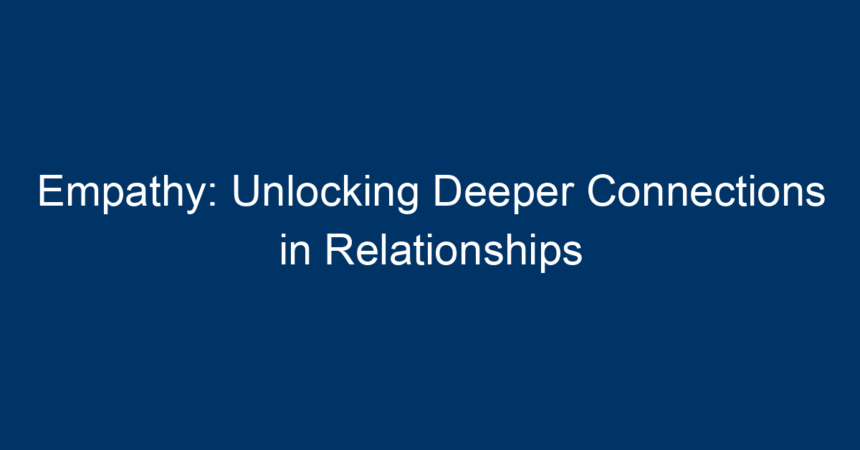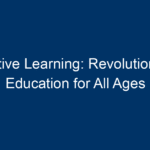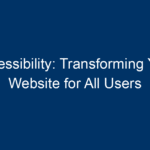In today’s fast-paced world, where digital interactions often overshadow face-to-face connections, the art of cultivating genuine relationships might seem daunting. Yet, at the heart of every profound relationship lies a powerful tool: empathy. Understanding and sharing the feelings of others is not just a skill; it’s a vital component that can transform the way we connect with friends, family, and partners. This article delves into the significance of empathy, exploring its role in forging deeper connections and practical steps to enhance this essential quality.
The Essence of Empathy
Empathy is the ability to put yourself in someone else’s shoes and to understand their emotions and perspectives. It goes beyond mere sympathy, which involves feeling sorry for someone; empathy is about truly grasping another person’s experience and validating their feelings. There are two primary types of empathy:
-
Cognitive Empathy: This involves understanding another person’s perspective or mental state. It’s about grasping what someone is feeling without necessarily sharing their emotional experience.
- Emotional Empathy: This aspect goes deeper, allowing individuals to physically feel what others are feeling. It’s an emotional contagion that can create a strong bond between individuals.
Understanding the distinction between these two types is crucial, as both play vital roles in nurturing relationships.
The Importance of Empathy in Relationships
1. Strengthening Bonds
Empathy is the glue that holds relationships together. By showing that you understand another person’s feelings, you signal that you care. This validation creates mutual trust and strengthens emotional ties. For example, in romantic relationships, couples who practice empathy are more likely to navigate conflicts effectively, as they are better at understanding each other’s viewpoints.
2. Enhancing Communication
Effective communication is a cornerstone of healthy relationships, and empathy significantly enhances it. When individuals feel heard and understood, they are more likely to express their thoughts and feelings openly. This openness can lead to deeper discussions and a more profound understanding of each other’s expectations and desires.
3. Conflict Resolution
Conflicts are inevitable in any relationship, but empathy can be the key to resolving them. By approaching disagreements with an empathetic mindset, individuals can better appreciate their partner’s feelings. This understanding helps mitigate anger and resentment, making it easier to find common ground and settle disputes amicably.
4. Fostering Support and Nurturance
Empathy encourages individuals to be supportive and nurturing to one another. Recognizing when a loved one is struggling and offering comfort can significantly affect their emotional well-being. Supportive relationships founded on empathy lead to healthier outcomes, both emotionally and physically.
Developing Empathy: Practical Steps
While some individuals may be naturally more empathetic than others, empathy is a skill that can be nurtured and developed. Here are actionable steps to enhance your empathetic abilities:
1. Active Listening
One of the most fundamental ways to practice empathy is through active listening. This means giving your full attention to someone when they are speaking without planning your response while they talk. Use verbal affirmations like "I understand" and "That sounds difficult" to acknowledge their feelings.
2. Practice Mindfulness
Being present in the moment is essential for empathy. Mindfulness practices, such as meditation or deep breathing, help cultivate a greater awareness of your feelings and those of others. When you’re more in tune with your emotions, you can connect with others more authentically.
3. Read Diverse Literature
Engaging with books, articles, or films that expose you to different perspectives and experiences can significantly enhance your empathetic capabilities. By stepping into another person’s world through storytelling, you can better understand their feelings and motivations.
4. Ask Questions
Encourage open dialogue by asking open-ended questions about someone’s feelings or experiences. This not only shows you care but also gives the other person a chance to share their thoughts in depth. Questions like "How did that make you feel?" or "What was going through your mind at that moment?" can elicit deeper conversations.
5. Reflect on Your Emotions
Take time to reflect on your feelings and how they relate to others. Journaling can be an excellent tool for this. By writing about your emotions and reactions, you can better understand your feelings and how they affect your relationships.
6. Engage in Volunteer Work
Volunteering is a powerful way to develop empathy. Working with individuals from diverse backgrounds and circumstances can help you appreciate different perspectives and challenges, fostering a deeper understanding of the human condition.
The Impact of Empathy on Mental Health
Empathy is not just beneficial for relationships; it also plays a crucial role in mental health. Individuals who can empathize with others often experience:
-
Increased Happiness: Helping and connecting with others can enhance your mood and overall happiness.
-
Reduced Stress: Responding empathetically to others can create a support network, reducing feelings of loneliness and isolation.
- Enhanced Emotional Resilience: Empathy enables individuals to accept their own emotions and those of others, promoting emotional resilience and adaptability during challenging times.
Empathy in Professional Relationships
Empathy isn’t just vital in personal relationships; it has significant implications in the workplace too. Leaders who demonstrate empathy create a culture of trust, collaboration, and engagement. Employees who feel understood and valued are more likely to be productive and committed to their organization. Additionally, companies that prioritize empathy tend to foster innovation and creativity, as open communication flourishes in empathetic environments.
Conclusion: Cultivating Empathy for Lasting Connections
Empathy is a skill that can unlock deeper connections in all types of relationships. By actively practicing empathy, you can enhance your communication skills, resolve conflicts more effectively, and foster a nurturing environment for those around you. Remember, the journey to becoming more empathetic is continuous; it requires patience and effort but yields immeasurable rewards.
By embracing empathy, you not only enhance your relationships but also contribute to a more compassionate and understanding world. Start small—listen actively, ask questions, and immerse yourself in diverse experiences. The benefits of empathy will transform your connections, leading to a life filled with more profound, meaningful relationships. Embrace the power of empathy and watch your interactions flourish.




